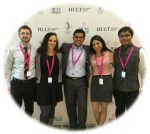 A team of graduate public policy students from the Bloustein School recently competed in the regional finals of the 5th annual Hult Prize in Boston on March 7-8, 2014. The world’s largest student competition and start-up platform for social good, the competition partners with President Bill Clinton and the Clinton Global Initiative, the innovative crowdsourcing platform, to identify and launch disruptive and catalytic social ventures that aim to solve the planet’s most pressing challenges. After the initial selection, student teams compete in regional competitions in six cities around the world for a chance to secure $1 million in start-up funding to launch a sustainable social venture.
A team of graduate public policy students from the Bloustein School recently competed in the regional finals of the 5th annual Hult Prize in Boston on March 7-8, 2014. The world’s largest student competition and start-up platform for social good, the competition partners with President Bill Clinton and the Clinton Global Initiative, the innovative crowdsourcing platform, to identify and launch disruptive and catalytic social ventures that aim to solve the planet’s most pressing challenges. After the initial selection, student teams compete in regional competitions in six cities around the world for a chance to secure $1 million in start-up funding to launch a sustainable social venture.
Members of the Bloustein team were Sayan Kundu (Kolkata, India), Neha Mehta (Skillman, NJ), Kushyup Shah (Livingston, NJ), Jared Sussman (Edison, NJ), and Becky Kelleman (Old Bridge, NJ). The teams’ skills include medical expertise, business, and field experience combined with passion and determination. This is the second year a Bloustein team has advanced to the regional finals.
The 2014 Hult Prize focused on the 250 million slum dwellers around the world suffering from chronic diseases who need help – a challenge personally selected by President Bill Clinton. The business idea for the Bloustein team identified lack of education and economic resources as two primary causes of poor health, and sought to improve diagnosis, care and treatment of non-communicable diseases and chronic illnesses through an all-encompassing community approach. “We start by engaging the community while providing free health clinics and ongoing health education workshops,” said Becky Kelleman, team representative. “Along with increased access to health care, we offer vocational training and job placement, which is linked to a reduction of mental illnesses and the promotion of a healthy lifestyle. Our model is scalable and our vision spans multiple continents − eliminating suffering for 13 million people over five years.”
Each team selected was chosen from more than 10,000 applications received from over 350 colleges and universities in over 150 countries. Following the regional finals, one winning team from each host city (Boston, San Francisco, London, Dubai, Shanghai and Sao Paulo) will move into a summer business incubator, where participants will receive mentorship, advisory and strategic planning as they create prototypes and set-up to launch their new social business.
Ahmad Ashkar, CEO and Founder of the Hult Prize, attributes the success of the competition to the shift in the global economy and the millennial generation’s refusal to live in a world with inequality, “We are giving entrepreneurs from around the world a platform to innovate and revolutionize the way we think about servicing the poor.”
Although the Bloustein team did not advance to the final round, the team was pleased with their experience and is looking forward to preparing for next year’s competition and providing guidance to other teams interested in competing. “We learned a lot from this experience and hope to modify our business plan in order to develop prototypes to test out later this summer in various urban slums areas,” said Neha Mehta.
Kelleman noted that much of their competition had gained experience for the event through inter-school competition, which is not currently in available to Rutgers students. She is working with Kristen Tyrrell, Regional Director of the Hult Prize Competition in Boston, to learn how other schools prepare their teams for competition and hopes to develop a similar plan for Rutgers.
